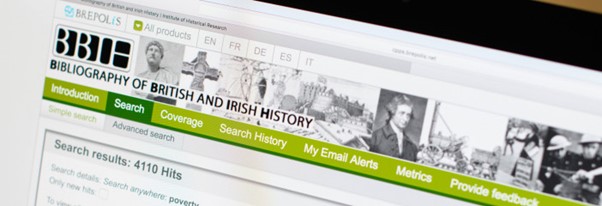This blog post was written by Ed Lyon, BBIH Section Editor

My name’s Ed Lyon, and I’m a PhD candidate at Birkbeck and the new Section Editor for 19th century British history. My research focuses on Irish nationalists in Victorian London, from the foundation of the Irish Republican Brotherhood in 1858 to the reuniting of the Irish Parliamentary Party in the 1890s. The Irish in London have been long overlooked and my research uncovers a vibrant political and social movement with ties to Liberal, Radical, and socialist movements in the metropolis.
Much of my research is based on the surprisingly full and candid reports of activity published in the Irish nationalist press and local newspapers in London. Details of meetings—often including information such as venue addresses and occasionally nationalists’ home addresses—allow me to track the development of the movement through its several phases, from sympathy with Fenians through Home Rule activism in local groups. But without the Bibliography of British and Irish History (BBIH) I would have missed a number of primary and secondary sources which allow me to set the microhistories which form the core of my thesis in context.
In my day job I work in academic libraries, at UCL and Birkbeck. In this capacity I assist students with their use of the libraries, and help them make the most of electronic resources for their research. Until I demonstrate the value of the BBIH I’m often fighting against their belief in Google Scholar. Google Scholar can be a valuable tool, especially for a quick and dirty search to see if there is material on a subject. But for anything beyond this, specialist databases like the BBIH are necessary. First and foremost, Google Scholar searches full text—one use of a search term within an article will bring it up. Google Scholar only returns a maximum of a thousand results. This sounds like plenty but there will be no differentiation made between an undergraduate dissertation, an introductory text, or a specialist work. And Google algorithms and advanced features can change without notice: you cannot rely on searches made on two dates returning the same results.
By contrast, the results of a search of the BBIH will be the same, with the only difference additional new titles added to the database. The BBIH records a session’s search history, allowing an easy record to help focus a developing search strategy. And the controlled vocabulary within the BBIH allows all the works contained on particular topics to be found, while looking by author will bring up everything historical by that specific author and not—as Google Scholar will—works by an author of the same name in other disciplines. The material found searching by subject or keyword on the BBIH will relate to the subject in question: it is not a full text search, but a metadata search—so you won’t waste time looking for the potentially one use of the term in a work. And there’s human involvement: editors have verified the bibliographic information, assigned it subject headings, and determined the dates covered by the text. The inclusion of chapters in the BBIH is very helpful too, bringing results from edited volumes which might not otherwise be considered. For example, I found a very useful chapter in a festschrift recently that I would otherwise have overlooked. In the few minutes I have with users I don’t have time to demonstrate the full functionality of the Bibliography but even these few basic tips help readers to receive more accurate and complete results than the use of an internet search engine would.
I’ve long been an advocate for the BBIH when helping history students—now, as a section editor, I hope to be more of an ambassador for the Bibliography.
My ORCID URL is here, and my Twitter account can be found at @EdLyon6.

